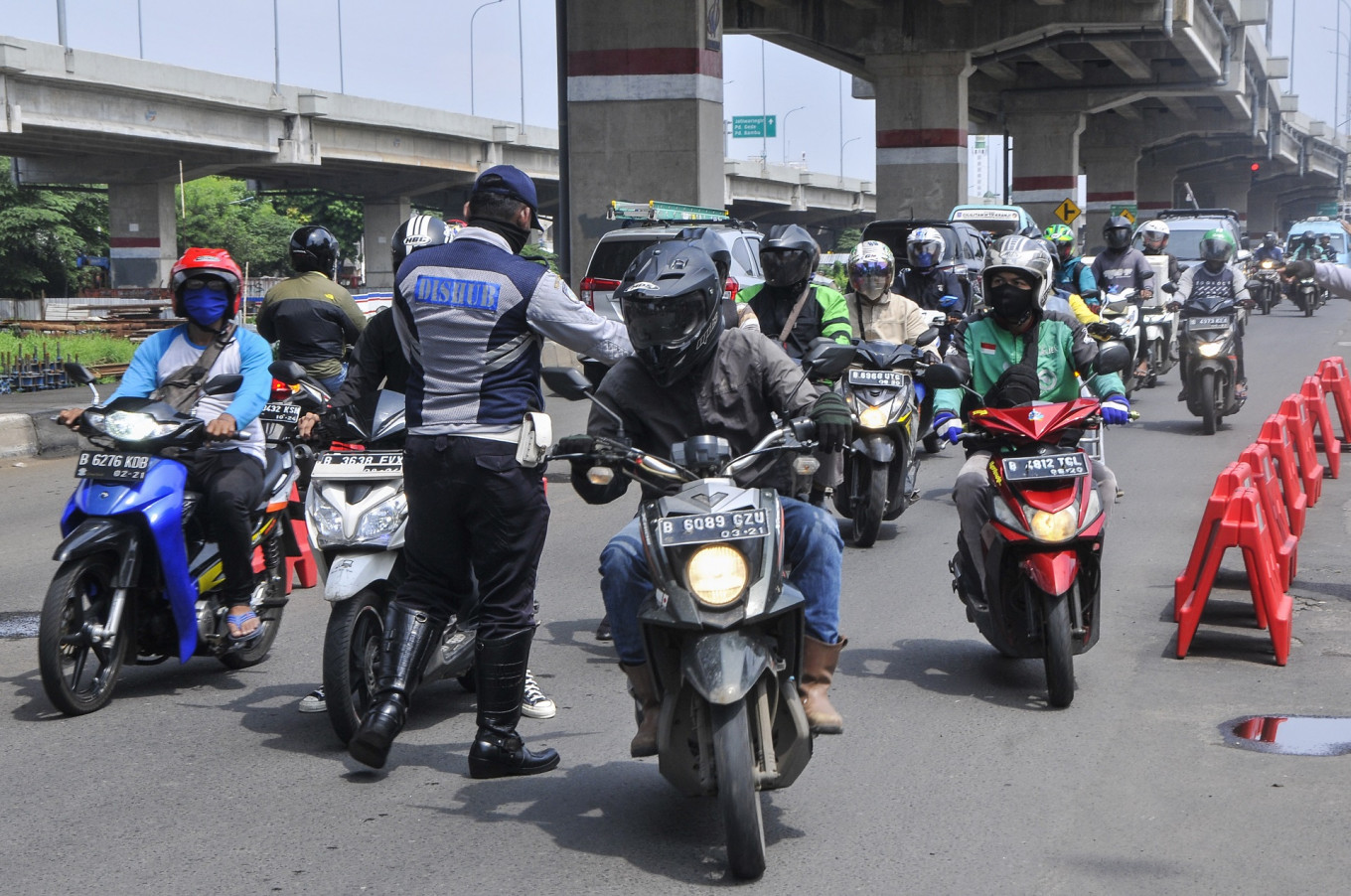Popular Reads
Top Results
Can't find what you're looking for?
View all search resultsPopular Reads
Top Results
Can't find what you're looking for?
View all search resultsExperts slam govt for 'inconsistent, poor' COVID-19 policies after transport relaxation
Law, economics and human rights experts have censured the government for its policy inconsistency that has led to disparate implementation and confusion at a time when the public needs certainty.
Change text size
Gift Premium Articles
to Anyone
 A traffic officer of the West Java Transportation Agency manages motorists on April 27 at a checkpoint in Kalimalang, Bekasi, West Java. Authorities have installed checkpoints across Greater Jakarta to enforce the government's 'mudik' (exodus) travel ban during the COVID-19 outbreak in Indonesia. (Antara/Fakhri Hermansyah)
A traffic officer of the West Java Transportation Agency manages motorists on April 27 at a checkpoint in Kalimalang, Bekasi, West Java. Authorities have installed checkpoints across Greater Jakarta to enforce the government's 'mudik' (exodus) travel ban during the COVID-19 outbreak in Indonesia. (Antara/Fakhri Hermansyah)
T
he government’s latest move to allow public transportation services to resume, even as the mudik (exodus) ban remains in force, has added unnecessary complications to that nationwide physical distancing policy. Experts say that the move is not only poorly calculated, but also inconsistent at a time when the nation's fight against COVID-19 should be strengthened, not relaxed.
Transportation Minister Budi Karya Sumadi reopened all air, land and sea transportation services on Thursday, saying the measure was necessary for the national economy to survive.
Although the new policy applies to certain individuals like state officials and medical workers and carries certain requirements, it has compounded the nationwide ban on all domestic travel to and from the so-called COVID-19 red zones.
Chairwoman Asfinawati of the Foundation of the Indonesian Legal Aid Institute (YLBHI) lambasted the new "travel relaxation", saying that any government policy adopted solely for economic reasons and with minimal consideration of public health was off target.
“It is worrying when the policies taken are not based on accurate data. The outcome may be worse, considering the small percentage of our population that has been tested compared to those of other countries,” Asfinawati told The Jakarta Post on Thursday.
Despite the government’s claim that the policy was intended to accommodate essential travel for public officials, COVID-19 patients and their families and Indonesians wishing to repatriate, Asfinawati feared that the policy could easily be misused.
“How are we going to verify all [travelers]? I said from the beginning [that] what are needed from the regulations are the details. With this [policy], public officials can easily fabricate a legitimate reason to go back to their hometowns. In the end, this would be class bias,” she stressed.
Read also: New regulation allows businesspeople, officials to travel despite ‘mudik’ ban
The government has been heavily criticized for its inconsistent stance on social distancing since the first large-scale social restrictions (PSBB) was implemented in Jakarta.
Ride-hailing ojek (motorcycle taxi) drivers were left confused as to whether they could still transport passengers when the capital implemented the PSBB on April 10.
While the Health Ministry rejected Jakarta’s request to allow ojek drivers to transport passengers, the Transportation Ministry issued a regulation that stipulated the opposite, which many pointed out was a contravention of the PSBB's implementing guidelines.
The government then issued the mudik travel ban on April 21, weeks after affected informal workers had started returning to their hometowns. President Joko Widodo attempted to fend off criticisms that the regulation came "too late", with an etymological claim that the Idul Fitri tradition of mudik was not the same as the "regular" pulang kampung tradition of returning to one's hometown.
This Wednesday, however, Budi Karya said that mudik and pulang kampung were the same thing and that the government was banning both under the President's instruction.
Economist and political analyst Ichsanuddin Noorsy pointed out other instances that showed the government's lack of commitment to COVID-19 mitigation, such as allowing international flights to operate normally despite the mudik ban.
Ichsanuddin also regretted the Manpower Ministry's plan to bring in 500 foreign workers from China in direct contravention of the Law and Human Rights Ministry’s recent temporarily ban on foreign arrivals to Indonesia.
Read also: Indonesia to revise 'overall data' on COVID-19 cases as govt scrambles to ramp up testing
“Almost all policies on COVID-19 [mitigation] are inconsistent,” he said on Wednesday as quoted by kompas.com, adding that such policy inconsistencies had led to weak inter-agency coordination in the field.
“[These] policies are not based on the correct understanding of the problems – [they are] poor public policy formulations,” Ichsanuddin said, adding that he was afraid public distrust of the government could grow as a consequence.
Similarly, Lokataru Legal and Human Rights Foundation executive director Haris Azhar said that the central and regional governments were out of sync in their stances on the COVID-19 social restriction policies.
“The stay at home order is to reduce transmission. [So] Why is it that the government is now facilitating public transportation?" he said.
"It’s confusing, because the regional administrations seem to want strict restrictions, but the central government keeps pushing the other way," Haris told the Post on Thursday.
Haris also called on the central government not to claim that Indonesia had succeeded in "flattening the curve" of COVID-19 transmission as a reason for making new policies.
“It should not use language that says we are [now] safe. The numbers are still going up,” he said.









